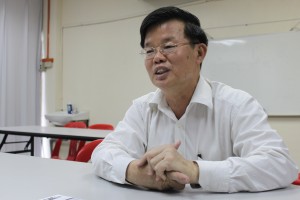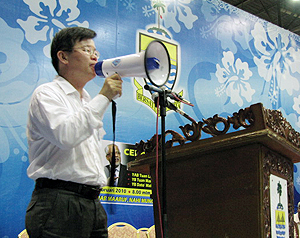 As the executive councillor (exco) in charge of the local councils (LC) and traffic management, Penang DAP state chairman and Padang Kota state assemblyman Chow Kon Yeow has taken the task with steady steering and resilience.
As the executive councillor (exco) in charge of the local councils (LC) and traffic management, Penang DAP state chairman and Padang Kota state assemblyman Chow Kon Yeow has taken the task with steady steering and resilience.
This is to be expected when handling one of the most crucial portfolios in the state government, as its delivery has the biggest direct impact on a voter in his daily life. In a heightened political environment such as post-2008 in Malaysia, Penang’s LCs every misstep gets public scrutiny beyond proportion. Chow talks about some of the achievements and challenges that the LCs have made since 2008.
Financial bind
To begin with, there was the issue of poor financial performance of the two LCs, namely Penang Island Municipal Council (MPPP) and Seberang Perai Municipal Council (MPSP).
Chow said the financial situation for MPSP was so bad that the state government had to order MPSP to appoint an independent audit committee to look into losses that it incurred. In all, MPSP had run eight consecutive years of losses, from 2000 to 2007. Altogether the deficits totalled around RM 230 million, leaving MPSP on the brink of financial bankruptcy in 2008.
Under PR’s tenure, MPSP has turned around financially; it has had budget surpluses three years running, chalking up RM 14.57 million surplus in 2009 and RM 23.04 million surplus in 2010. Cash reserves have also increased from RM 20 million in 2008 to RM89 million in 2010. Like the MPSP, the Penang Island Municipal Council (MPPP) also made a budget surplus in 2009 – RM49 million – which was a record for the body.
Impartial Enforcement
Another area of contention was the regulating of unlicensed hawkers. Penang is dependent on tourism, and its hawkers play a substantial role in the state’s economy. In a multi-racial society like Penang, stringent enforcement on any particular area that happens to be dominated by a particular race would be construed as discriminating against that race. However, Penang LCs set out to do what is right, not enforcing regulations based on racial considerations.
“DAP was attacked relentlessly by UMNO as discriminating against the Malays hawkers. Yet statistics proves otherwise; in MPPP, the cases of Malay unlicensed hawkers taken action on only comprised a total of 33 percent of the total number of cases, the majority comprised Chinese hawkers (58 percent). Now even MCA and Gerakan are getting in the fray by calling us anti-Chinese!” Chow said.
He added that the irony is Penang currently has around 3000 unlicensed hawkers, whilst there is also around the same number of vacant hawker stalls available in hawker complexes throughout the whole state. Many hawkers are not disposed to the allocated positions; there is a mismatch of demand and supply.
There is also the issue of illegal structures put up by the hawkers. If these illegal structures are not removed, many unlicensed hawkers will be emboldened to set up more stalls in that area. Many of these illegal structures are made by unlicensed Malay hawkers; when the LCs try to tear them down, allegations of racial discrimination start flying at the LCs and DAP.
“The heat sometimes gets to our PR component parties’ elected representatives. Some of them have had to badger the LCs not to demolish the stalls less the reports get blown up by the media. It is a fine line for us to tread on,” he said.
Improving Cleanliness
 In 2007, after the Solid Waste Management and Public Cleaning Act was passed in which the federal government was to have direct control over the disposal of solid waste, the federal government had directed the LCs not to renew the local waste disposal contractors’ contracts, with the aim of centralising the functions under one contractor.
In 2007, after the Solid Waste Management and Public Cleaning Act was passed in which the federal government was to have direct control over the disposal of solid waste, the federal government had directed the LCs not to renew the local waste disposal contractors’ contracts, with the aim of centralising the functions under one contractor.
Also, the LCs were informed to not extend the cleaning workers’ contracts as the cleaning was also to be taken over by the said cleaning contractors. According to Teresa Kok, Seputeh Member of Parliament, under Section 105 of the act, no legal action could be taken against the director general or his officials on the matter; in effect the federal waste disposal was not open to questioning.
According to Chow, this put the LCs in a bind; public complaints on the LCs areas’ cleanliness could not be addressed directly by them as they had to go through the contractors to take action. They were also facing cleaning staff attrition due to their retirement.
“When PR took over, we decided not to follow the federal government’s directive. We undertook to appoint our cleaning contractors to perform cleaning functions. The rubbish collection hours was also revamped to 5 am (from 8am) as many hawkers operate deep into the night. We have also launched the “Cleaner Greener Penang” campaign to boost the people’s civic awareness of cleanliness.
“Another effort we undertook was to acknowledge and appreciate our cleaning service staffs’ contribution. Many of the long-time drain cleaning staffs were given cash rewards and state awards for their services. It helps to boost their morale and work commitment as well as increase the public’s awareness of their contributions. Some of these measures have helped Penang to be cleaner than before,” he said.
Making The Community Safe
Another major area of concern is public safety. Although the LCs are not directly responsible for public safety, it took the initiative to implement several remedial steps to increase public security. Since 2008, CCTVs installation is mandatory in private car parks and MPPP has installed more than 56 CCTVs on one-third of the island’s major roadways and also on crime-prone areas.
Another pertinent role that the LCs have performed is to install and upgrade the physical structures such as road railings and traffic lights to buffer the pedestrians’ safety. The state government also has integrated the various existing local volunteer patrol teams into a coordinated unit as well as established new volunteer patrol teams to do more community policing.
Chow said the state police’s efforts and cooperation in policing the streets play a major part in ensuring public safety.
“We are now seeing results for the above efforts; Penang has registered a 27 percent drop in crime rates in 2010, the highest in the country. In the first half of this year, Penang registered another 26 percent drop from the previous year as well,” he added.
Transport Initiatives
To help alleviate the worsening traffic situation, Chow said the state government has introduced several transport initiatives.
“We have introduced the BEST (Bridge Express Shuttle Transit) bus service that connects the island and mainland commuters. 16 buses are rented at RM160,000 a month to ferry commuters across the causeway. On the island, three CAT (Central Area Transit) buses ply the Georgetown area free of charge for its passengers,” he said.
For long term plans, the state government has commissioned a Penang Transport Masterplan to study the long term transportation options for Penang, which began in May this year and is due for public viewing next year. However, it must be stated that transport licensing and infrastructure development matters are the federal government’s responsibility and the state government is limited in its ability to change the state transportation structure on its own.
In another aspect, the people’s penchant for private vehicles usage is a daunting challenge to overcome in promoting public transport usage. Thus far the public participation for the BEST buses has not reach the target level of 800 commuters a day. But the state government is doing what it can under the current legal and administrative environment to mitigate the state’s transportation woes. -The Rocket




